New Issue of Childhood Education Innovations Includes Articles on Education Innovation, Humane Education, and More
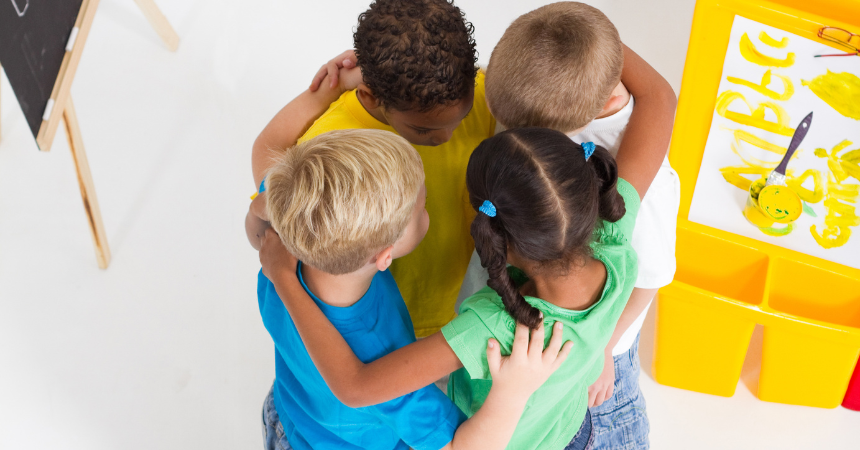

The newest issue of Childhood Education: Innovations features unique, stimulating information about educational programs around the world. The November/December 2024 issue includes articles on innovation, humane education, and more.
Two of these articles are currently freely available to the public, while the others are available to magazine subscribers or for a download fee. Access to the free articles is available here:
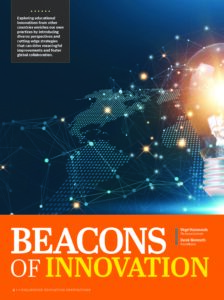
For many countries, the education system has not caught up to prepare today’s young people for the future. We know how intractable the status quo is, and how challenging it can be to move innovation forward. We also know that many folks are pushing back against the traditional system. We see examples of schools, districts, states, and learning communities in our networks that are pushing innovation forward. Yet, we don’t yet see these advances happening at scale. But change is possible — we can create more nimble, future-focused, and personalized education systems. We know this to be true because schools, learning communities, systems, and countries across the globe are paving the way and breaking the mold. These communities are firmly incorporating innovation as a guiding principle in the design and operation of their education systems, in turn making them more relevant and meaningful for a new generation of learners and leaders.
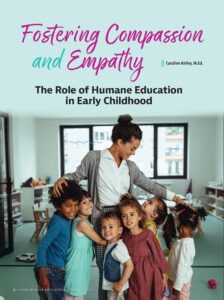
Bringing peace to our world is a profound aspiration, and it can be achieved by instilling the values of empathy, compassion, and respect in young children through humane education. Humane education sows the seeds of hope for a future that can heal our planet and usher in positive societal change. Humane education not only fosters a sense of responsibility and stewardship for the planet but also encourages critical thinking and problem-solving skills that are essential for resolving conflicts without resorting to violence. By equipping young minds with knowledge and values that prioritize compassion, we are shaping a more compassionate and just society where differences are understood and respected and conflicts are resolved through dialogue and understanding. The hope of humane education rests on the belief that each new generation can become agents of change in their communities, leading us toward a more humane and just world.
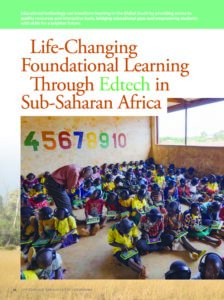
All children have immense potential, but millions lack access to the learning they need. This is especially true for girls and other marginalized children. Basic literacy and numeracy are the keys to unlocking a child’s potential and improving their health, wealth, and social outcomes — and these improvements extend to whole families and future generations. Imagine Worldwide’s goal is to solve the literacy and numeracy crisis for millions of children across Sub-Saharan Africa. They provide a tablet-based, personalized learning solution specifically designed to overcome the systemic barriers that have historically prevented the widespread adoption of edtech in the developing world.
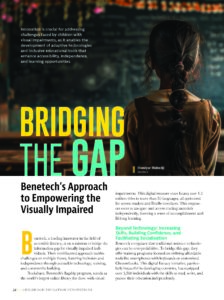
Benetech, a leading innovator in the field of accessible literacy, is on a mission to bridge the information gap for visually impaired individuals. Their multifaceted approach tackles challenges on multiple fronts, fostering inclusion and independence through accessible technology, training, and community building. Bookshare, Benetech’s flagship program, stands as the world’s largest online library for those with visual impairments. This digital treasure trove boasts over 1.3 million titles in more than 50 languages, all optimized for screen readers and Braille interfaces.
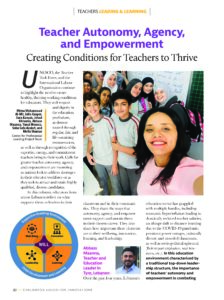
UNESCO, the Teacher Task Force, and the International Labour Organization continue to highlight the need to create healthy, thriving working conditions for educators. They seek respect and dignity in the education professions, as demonstrated through regular, fair, and life-sustaining remuneration, as well as through recognition of the expertise, energy, and commitment teachers bring to their work. Calls for greater teacher autonomy, agency, and empowerment are mounting as nations look to address shortages in their educator workforce or as they seek to attract and retain highly qualified, diverse candidates. In this column, educators from across Lebanon reflect on what supports them as leaders in their classroom and in their communities. They share the ways that autonomy, agency, and empowerment support and sustain them in their chosen career. They also share how important these elements are to their wellbeing, innovation, learning, and leadership.
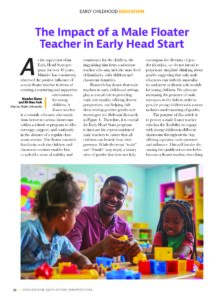
Research has shown that male teachers in early childhood settings play a crucial role in providing male role models, offering diverse perspectives, and helping children develop positive gender-role stereotypes. Therefore, it is crucial for Early Head Start programs to increase the representation of male teachers to ensure that all children can benefit from their presence. The purpose of this article is to present a male floater teacher who has the flexibility to engage with young children in different classrooms throughout the day, offering a positive male presence and influence. This will involve discussing the qualifications needed to become a floater teacher, describing the associated responsibilities, and highlighting the benefits within the Early Head Start program based on firsthand experience as a supervisor and observations of a male floater teacher. Additionally, the article aims to challenge the stereotype of early childhood education being exclusively a “woman’s job” and advocate for gender diversity within the profession.
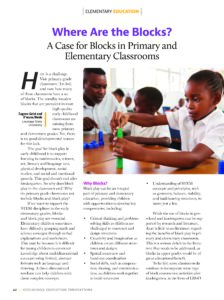
The goal for block play in early childhood is to support learning in mathematics, science, art, literacy and language arts, physical development, social studies, and social and emotional growth. This goal doesn’t end after kindergarten. So why does block play in the classroom end? Why do primary grade classrooms not include blocks and block play? If we want to support the STEM disciplines in the early elementary grades, blocks and block play are essential. Elementary children sometimes have difficulty grasping math and science concepts through verbal explanations and worksheets. This may be because it is difficult for young children to construct knowledge about multidimensional concepts using limited, abstract formats such as language and drawing. A three-dimensional medium can help children with these complex concepts.
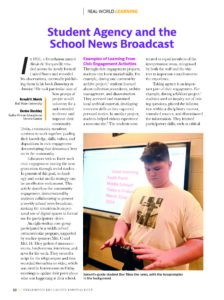
Taking agency is an important part of civic engagement. Student-developed news broadcasts that help peers understand current events in their school and community are a particularly appealing and effective way to involve young people in civic engagement. Students learn to identify credible information and find valid sources and to appreciate the role that work plays in mass communication. They also learn about public speaking and how to deliver a message in an organized, clear, and concise manner. Through the broadcasts, students demonstrate agency as they help their school community work more effectively through information dissemination.
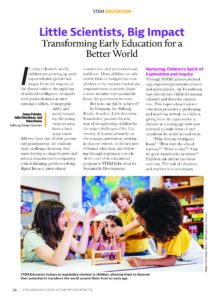
In today’s dynamic world, children are growing up amid unprecedented global challenges. From the urgency of the climate crisis to the rapid rise of artificial intelligence, alongside such persistent issues as international conflicts, demographic shifts, and social inequality, the youngest generation faces a landscape much different from that of their parents and grandparents. To confront these challenges head-on, they must develop a comprehensive skill set and dispositions encompassing critical thinking, problem-solving, digital literacy, intercultural competence, and socio-emotional resilience. These abilities not only enable them to navigate the complexities of the modern era but also empower them to actively shape a more inclusive and sustainable future for generations to come. In Germany, the Stiftung Kinder forschen (Little Scientists Foundation) pursues this mission of strengthening children for the major challenges of the 21st century. It focuses primarily on the youngest generation, starting in daycare centers, as the first sites of formal education, and following through in primary schools. At the core of its educational program is STEM Education for Sustainable Development.
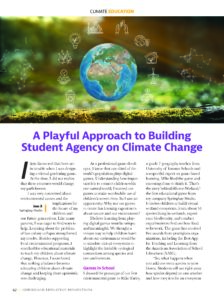
Teachers face a challenge when striving to cultivate student agency on climate change. The current environmental education is focused more on cognitive knowledge building and not so much on taking actionable steps toward a more sustainable lifestyle, which leads to children experiencing climate anxiety. Likewise, we don’t have an established environmental curriculum to encourage students to consistently work toward a more sustainable lifestyle. While there are some amazing environmental activities taking place, they tend to be one-off, isolated events and school boards struggle to quantify the impact such events have had on participants’ long-term behavioral development. It is crucial to help students experience how small changes can collectively make a significant difference. What if we could design a program to engage students in consistently measuring their carbon footprint in real life? If the entire program is centered around play, with a combination of online environmental games, offline learning activities such as planting trees, plus tracking our CO2 savings, we can offer the current generation a valuable, impactful learning experience that is also fun.
Childhood Education: Innovations is an education magazine that highlights cutting-edge innovations in children’s education from around the world. Articles explore solutions to specific challenges affecting schools, teachers, and learners and showcase the most recent innovations being developed and implemented to address those challenges. Readers will find inspiration for transforming education to better serve children and society.
Published 6 times a year, CE Innovations provides a window into the work being done to bring quality, equitable education to all children. It stands alongside the Journal of Research in Childhood Education as one of our signature publications.
Explore CE International's consulting services.